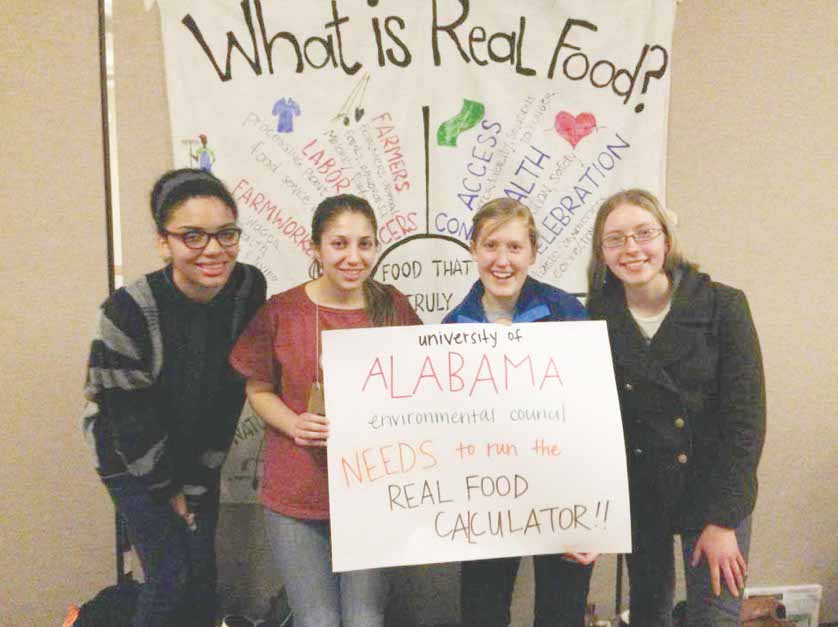In a world where food is measured in calories, it can be easy to forget there are other ways to measure the quality of a meal.
The University of Alabama Environmental Council, or ECo, is partnering with the Real Food Challenge, a nationwide campaign, to bring real food to campus dining halls. In this measurement, real means local, community-based, ecologically sound, fair and humane.
Olivia Bensinger, a senior in New College also majoring in Spanish, serves as the Real Food Challenge coordinator, as well as chair of ECo’s Sustainable Food Committee.
There are two aspects to the campaign, Bensinger said. The first will be using Real Food Challenge’s Real Food Calculator to determine the current condition of the University’s dining options.
“It’s a huge research project. Basically, we end up with a percentage,” she said. “We’ll actually be starting that process in October.”
Bensinger said the Real Food Calculator has become the baseline for calculating how real certain foods are, a process that will involve using invoices from Lakeside Dining Hall during the months of September and February.
“The second part of the campaign, which we have not started yet, is the campus commitment, which basically involves going to the campus president and getting her to sign to commit to 20 percent real food by 2020,” she said. “We’ll probably be launching the campaign to get the commitment probably in the spring, if not sooner.”
During the Real Food Challenge, ECo will also be organizing the 100 Mile Dinner, which will take place on Food Day, Oct. 24.
“Food Day is a national celebration of healthy, affordable, sustainable food. On campuses, it’s usually run by the Real Food Challenge,” Bensinger said.
The 100 Mile Dinner will feature foods prepared with ingredients produced within 100 miles. Student tickets will be $15, and non-student tickets will be $25.
Ultimately, Bensinger said, it all will connect back to real food. The Real Food Wheel, produced by Real Food Challenge and reproduced by ECo in painting, demonstrates how many different facets of life influence and are influenced by real food.
“It goes back to the wheel and how you personally connect to it. I got to food through climate activism … It made sense to lessen my carbon footprint, to eat locally, to eat humanely,” she said. “You have to find a place … and find how it fits into the bigger picture and go from there.”
Johanna Obenda, a sophomore majoring in history who is on the Sustainable Food Committee, said she connected to the wheel through the community aspect, specifically through her work at a local farmer’s market.
“It was nice just seeing people come in,” she said. “It was really awesome to see people get real food and get connected that way, and I guess I got connected that way.”
Julie Whitten, a sophomore studying environmental science who attended the Real Food Challenge conference in January with Bensinger and Obenda, said they were determined to get the ball rolling with bringing real food to campus.
“This is important because everyone is connected to the food system. Food is essential for life and the food we choose to consume has an impact far greater than we could even imagine,” Whitten wrote in an email. “[We] hope to bring light to the complexities of the food system, but mostly show students, faculty, staff, and the community the importance of knowing where our food comes from, what it’s made of, and how we can take steps towards treating our bodies, our fellow human beings, and our earth with respect.”
She also explained how the definition of “real” food covered food’s many spheres of influence.
“The ecologically sound part focuses more on the earth aspect … It’s good for the Earth and it’s good for you,” she said. “Fair goes into the labor market … humane is animal welfare.”
She pointed out that the University currently has several initiatives that are moving in the right direction.
“All of our eggs are cage-free. Our milk is relatively local (within 250 miles, which is the benchmark). All of our coffee is fair trade,” she said. “We do have a rule where we have to buy local first. We just don’t have a lot of local farmers that source to Sysco (the University’s food provider).”
She said part of the campaign will be pushing to eliminate automatic disqualifiers such as artificial high fructose corn syrup and certain food dyes.
“We’re not going to take away anybody’s grill line. [We’re just] making it better quality,” she said. “We’re not trying to force people to eat healthy. We’re just giving them the option.”
That could involve simple shifts in purchasing – organic ketchup, for instance – and could lead to more seasonal menus.
Those simple shifts start in October, when they start to crunch the numbers on the Real Food Calculator.
“We’ll be able to see how far we have to go,” Bensinger said. “We can always push for more and create new commitments after 2020.”
ECo meets Thursdays at 7 p.m. in Lloyd, with Real Food Challenge meetings following at 8 p.m.









